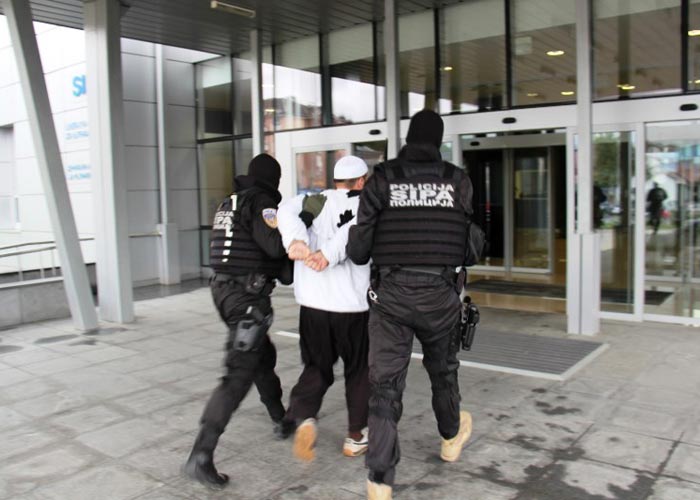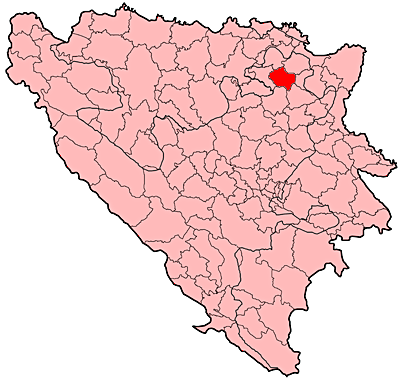By Medina Malagic and Igor Spaic
Bosnia’s Wahhabis Are Targets of BiH’s Latest Police Action
Опубликовано: 10 Сентябрь 2014

SIPA operation "Damask"
Sixteen men were arrested in Bosnia and Herzegovina on Sept. 3 for raising money to recruit and send people to fight for the Islamic State of Iraq and Syria (ISIS).
Who are they, and how do they fit into the bigger picture of Islam in BiH?
The men arrested in the nationwide operation carried out by 200 officers of Bosnia’s State and Investigative Agency (SIPA) fit an ideological and physical profile that has become easily recognizable among the BiH public.
Members of this group promote fiery conservative religious rhetoric and sport long, untrimmed beards and calf-length pants indicating their adherence to Wahhabism, an ultra-conservative interpretation of Islam that originated in Saudi Arabia in the 18th century and is widely promulgated by the Saudi government today.
More mainstream Bosnian Muslims, called Bosniacs, say that this group does not reflect Islam as they know it in Bosnia, and that most people reject such extremism.
“I strongly judge the Wahhabis that I see among us,” said Aisha, a vegetable seller in Sarajevo who did not want to give her full name. “The way they dress, their behavior … As a believer, I am disgusted by these young men.”
She says she believes in religious freedom, but that terrorist activities are criminal behavior that must be punished. “We are in Bosnia, in Yugoslavia. We have taught ourselves to live alongside each other,” she said.
And even though that culture of tolerance failed during the brutal 1992-1995 war, she said, “in order to avoid the evil that happened to us, Muslims and others, from happening again, we must be educated.”
Last week’s roundup, dubbed “Operation Damask,” was the first police action taken since BiH introduced prison sentences earlier this year of up to 10 years for citizens who fight in conflicts abroad or who recruit fighters to do so.
This is not the first time that Bosnian followers of Wahhabism have been targeted. In 2010, around 600 Bosnian police raided the remote mountain village of Gornja Maoca (in the country’s northeast, the center of Bosnia’s Wahhabi community). Seven of the village’s 100 residents were arrested, and arms, ammunition, cell phones, computers, and cash were seized. The suspects were released the same month.

In a country with a moderate and secular Islamic tradition, the Wahhabi presence in BiH has a short history. It was unheard of until the 1992-1995 conflict, when an influx of Islamic fighters, mostly from Arab countries, came to fight alongside Bosnian Muslims. While most of the foreign fighters have left the country, the ideology remained and garnered a small but committed following.
This radical interpretation of Islam gained solid ground during a violent period in the country that witnessed the breakdown of its multi-ethnic character, setting the conditions for the spread of a strict interpretation of Islam supported by some Muslims.
In addition to foreign fighters, assistance during the war in BiH came in the form of financial aid, primarily from the Saudis, whose donation of US $373 million set the stage for an ideological influx. The aid went to social programs, such as building Islamic schools, mosques and infrastructure reconstruction projects.
While the Wahhabis have drawn a great deal of police and media attention, adherents represent a tiny percentage of the country’s population. A 2013 study conducted by the European Parliament concluded there are around 3,000 followers of Wahhabism out of BiH’s 1.4 million Muslims.
However, in the past few years several attacks in the country and the controversial statements by the leadership of the group have made their presence more visible and have raised fears of its growing influence.
In 2010 a car bomb exploded in the central Bosnian town of Bugojno, killing one policeman and injuring six of his colleagues. Haris Causevic was sentenced to 45 years in prison for planning, organizing and carrying out the attack. It was the longest prison sentence handed down to a BiH national for an offense other than a war crime.
Mevlid Jasarevic, from the majority Muslim town of Novi Pazar in Serbia, opened fire on the US Embassy in Sarajevo in 2011, injuring one police guard.
Both men allegedly belonged to the Wahhabi strain of Islam, and Jasarevic has reportedly spent time with Wahhabi communities in Vienna and in Gornja Maoca.
Since the arrests last week, and as more reports surface on recruitment of fighters from many countries to fight in Syria and Iraq on the side of ISIS and similar groups, Bosnian media has once again turned its focus on this controversial community.
Local media reports that around 150 BiH citizens were or are still engaged in combat on the side of extremists in Syria and Iraq. A list of 41 former and current combatants, most of whom appear to be young men, was released by BiH’s Federal Television. Some of the young men have since returned to BiH.
Investigators at SIPA are continuing to probe the logistics behind the recruitment, organizing, planning and financing of the trips to Syria and Iraq.
Among the 16 suspects arrested Sept. 3, the best-known is 42-year-old Bilal Bosnic, the self-proclaimed sheikh from the northwestern BiH town of Buzim.
On Sept. 7, the BiH Court has determined that five of the suspects, Bosnic among them, would remain in police custody for one month on suspicion of terrorism. Three of the five range between the ages of 22 to 31.
According to the BiH newspaper “Slobodna Bosna”, when police entered Bosnic’s home in Buzim they found his 16 children, four wives and 12 guests, whom Bosnic said were students there for religious instruction. The newspaper also reported that before his religious conversion, Bosnic tried to build a music career in Austria and Germany, playing accordion in a folk band that performed in small bars.
Local media reports that Nusret Imamovic, the former alleged leader of the Wahhabi community in Gornja Maoca, has been in Syria since the start of this year, fighting against ISIS for the Al-Qaeda subgroup Jabhat al-Nusra. BiH’s new law could create complications for Imamovic if he were to try to return to BiH, as well as other BiH citizens who are currently engaged in armed combat in Syria and Iraq.
The website putvjernika.com (path of believers), which has been described as a mouthpiece for BiH’s Wahhabis, as well as statements and lectures by Bosnic provides insight into the intentions and higher aims of the Wahhabi community in BiH.
After the arrests by SIPA, an article appeared on the website entitled “State Terrorism and Double Standards: BiH Police Forces Arrest “Wahhabis” Throughout the Country.”
In response to SIPA’s statement that the suspects were detained due to charges of financing and organizing BiH citizens to fight for extremist organizations in Syria and Iraq, the site argued that SIPA and the media did not say how the suspects endanger the territorial integrity of BiH and its citizens. SIPA and the media are blamed for putting on a spectacle in order to convince citizens of the dangers of the group.
The website did not deny the accusations levied against the suspects, but shifts the focus to emphasize that the group faces discrimination and marginalization by the state apparatus that does not accept them as a part of society.
In an exclusive interview on Bosnian TV in 2013, Bosnic said his missionary work is transparent and says the group’s followers live according to the Quran, Islam’s holy book. When asked about his stance on Al-Qaeda, Bosnic said that it is his religious right support Muslims involved in a struggle and that people who have a problem with it are not democratic. But he points out that it is a struggle that he is not a part of, because he is not currently at war with anyone.
Bosnic speaks vaguely about the establishment of an Islamic state, and said “we want traditional Islam to rule here.” But, he says, “We Muslims never forced anyone to convert, because that is someone’s free choice.”
In this video, Bosnic can be seen preaching an Islamic sermon with two ISIS flags behind him.
The most visible example of Wahhabi influence in Sarajevo, BiH’s capital city, is the sprawling King Fahd mosque, whose architectural design is typical of a Saudi Wahhabi mosque.
On the Friday after the SIPA raid, the Dzuma prayer, a special weekly service attended by men, was well attended, including a number who appeared by their dress to be Wahhabis.
In his hutba (sermon), Nezim Muderis Halilovic talked about education, solidarity with the poor and equitable money distribution. Halilovic has little to do with the mosque himself, as he is assigned to preach there by the Islamic Community – the institutionalized official Muslim authority in the country.
According to some of the members of the Dzemat (mosque community), Bosnic recently tried to lecture at this mosque, but did not get approval from the Islamic Community. When asked why he was rejected, Halilovic answered, “He does not fit into our concept here.”
Outside the mosque, some individuals said the recent arrests are an attack on Islam, and that “this is all because of the elections”.
ISIS has been criticized for misappropriating Islam and acting as if it is its sole representative, and the group is described as anti-Islamic. In a recent report, UN investigators have said that both the Syrian government and ISIS are committing war crimes and crimes against humanity.
The UN Human Rights Council held a special session last week to discuss a draft resolution to investigate war crimes. Among the alleged atrocities is forced conversions and violence against members of ethnic and religious minorities.
